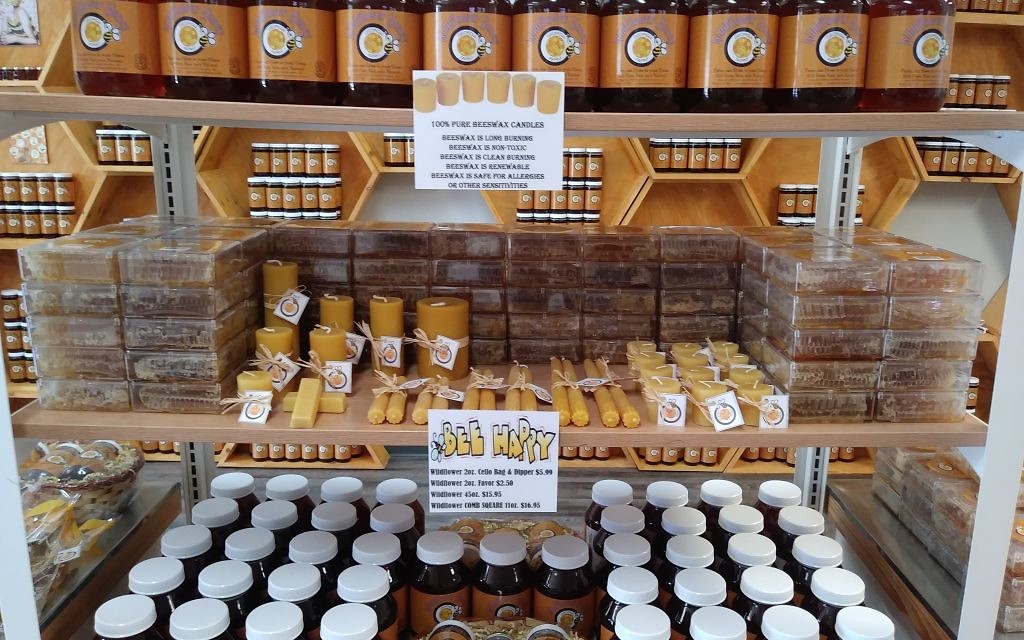Local Bees Busy for Atlanta’s Holiday Honey
Georgia bee farms offer countless varieties of honey in time for new year.
“If you’re a beekeeper and make honey, you’re going to get stung,” 81-year-old Jim Mabry said.
He owns Mabry Farm Apiary at 4480 Sandy Plains Road in Marietta, where he produces wildflower honey and sells it by the pint and quart.
Mabry Farm is one of several sources of honey produced in Georgia and distributed in time for the High Holidays.
Get The AJT Newsletter by email and never miss our top stories Free Sign Up
Mabry was born on the farm, which was purchased in 1904, and has run the apiary for more than 45 years. This year his bees produced 75 gallons of honey from the clovers, blackberries, apples, peaches and tulip poplars flowering on his property.
“This is honey produced in Cobb County,” he said. “But I guess I just do it out of habit. My wife’s sister and brother-in-law bought beehives and put them on my farm. After a few years they abandoned them, and I decided to be a beekeeper.”
It was easier to keep the bees alive when he began, but Mabry said Varroa mites, an external parasite, popped up in 1987 and began to attack bee colonies, making it difficult to sustain an apiary.
But Mabry continues his work for the sweet return he gets from beekeeping. Mabry sells jars of honey at $17 a quart and $9 a pint, and he’s usually sold out by mid-October. He also eats honey every day in his coffee and oatmeal and on his pancakes.
“The only thing I know about honey is it’s better than sugar,” Mabry said. “People like sweet things, and honey is a lot more nutritious than sugar.”
Georgia Honey Farm at 3000 Old Alabama Road, No. 111, in Alpharetta focuses on the nutritional benefits of honey.
It is a family-owned business run by Alex Pakdaman and his wife, Kat. They are Persian Jews who own an apiary in the Blue Ridge Mountains. The location allows the bees to produce various types of honey, including sourwood, gallberry, wildflower, tupelo and orange.
The honey produced by the Pakdaman family is kosher because “if you focus on quality of business and take no shortcuts, G-d will bring you blessings,” Alex said.
The bees are fed their own honey according to what is collected in the spring, instead of sugar or corn syrup; as a result, Georgia Honey Farm is kosher year-round and does not crystallize. Right now is harvest season for the Pakdamans, and they are processing online orders for Rosh Hashanah at georgiahoneyfarm.com.
Alex has been a beekeeper for 27 years, and the family opened Georgia Honey Farm a year ago. They sell candles made from honey, honey sticks, and dried pollen and honeycombs for consumption.
Health and well-being are huge elements of their work, Alex said. The Pakdamans provide recipes such as honey and cinnamon tea to combat arthritis, lower cholesterol, aid in weight loss and fight diabetes. Honey is a much healthier supplement than eating chocolate, Kat said.
“I’ve replaced sweet treats like chocolate with a honey stick, which is only 15 calories, as opposed to 200 calories,” Kat said. “A lot of our customers give up sugar to use honey, and when they try to use sugar again, they can’t because they realize how bad it tastes.”
Each type of honey provides a different flavor. For instance, gallberry is heavier and very sweet, much like wildflower, which is what you can find in most grocery stores. But every batch of wildflower honey tastes different, depending on the flowers or trees the bees pollinated.
For roasting something like a chicken for Rosh Hashanah, Kat suggests wildflower because of the heavier taste. She recommends sourwood for fish because of the light, buttery taste and gallberry for baking because of the deep, tart taste.
Savannah Bee Co., which recently opened at Suite A01 at 1100 Howell Mill Road in the Westside Provisions District, also has a variety of honey and related products that can be used differently, depending on taste. The options include rosemary honey, which has a perfumelike taste, sourwood, orange blossom, lavender, black sage, tupelo and velvety palmetto.
Savannah Bee also carries about 30 types of mead, which is wine fermented from honey.
Ted Dennard, the owner of Savannah Bee, has been a beekeeper for more than 20 years and taught beekeeping in the Peace Corps in Jamaica but never thought it would become a profitable business.
“I did it all for fun and love,” Dennard said. “Now I’m able to reach hundreds and thousands of people in stores.”
He began selling honey in 2000 and opened Savannah Bee Co. in Savannah in 2008. A local synagogue was one of the first businesses to buy his kosher honey, putting it in the gift shop, Dennard said.
“Honey is huge in the Jewish community, and every September we have apples and honey sitting out for Rosh Hashanah,” Dennard said.
His company’s other honey-based products include lip balm, candles, whipped honey, honey barbecue sauce and honey energy drinks. The bees come up with the ingredients, and Dennard said he just curates the products.
The lip balm, body balm and shampoo, all made with royal jelly, are among his most popular products.
When he began selling honey, he was the company’s only beekeeper, but now hundreds of beekeepers are contributing to Savannah Bee. He started a nonprofit, the Bee Cause Project, which puts glass beehives in schools throughout metro Atlanta, giving children the opportunity to observe honeybees building honeycombs.
Humans need bees for pollination to grow healthy fruits and vegetables, a fact Dennard hopes to relay to everyone who comes into his store.
“I’m trying to raise a generation that loves, understands and protects honeybees,” Dennard said. “It started with an old man teaching me about beekeeping and honey, and once you understand what they’re doing for the world, you bow down.”







comments